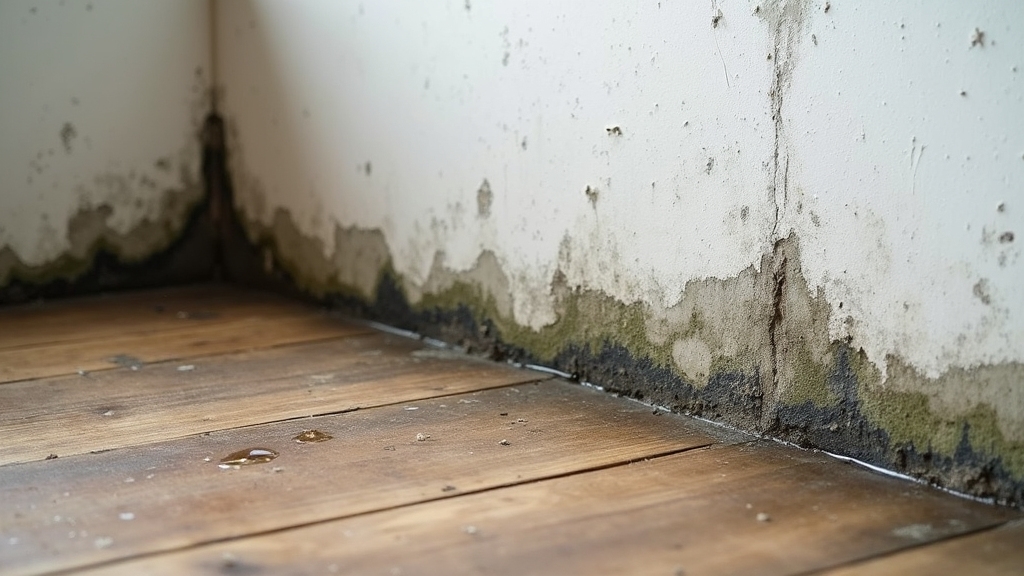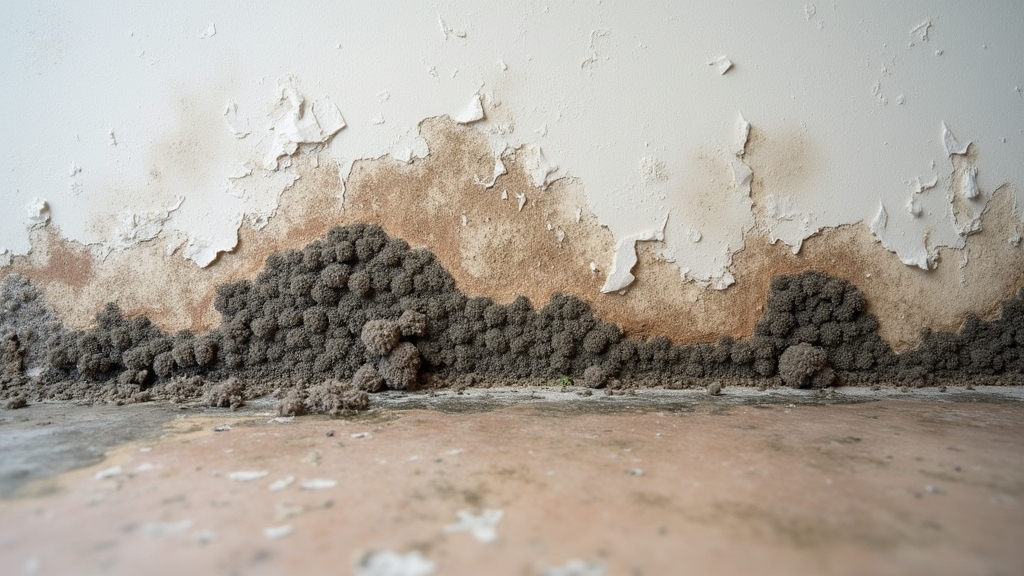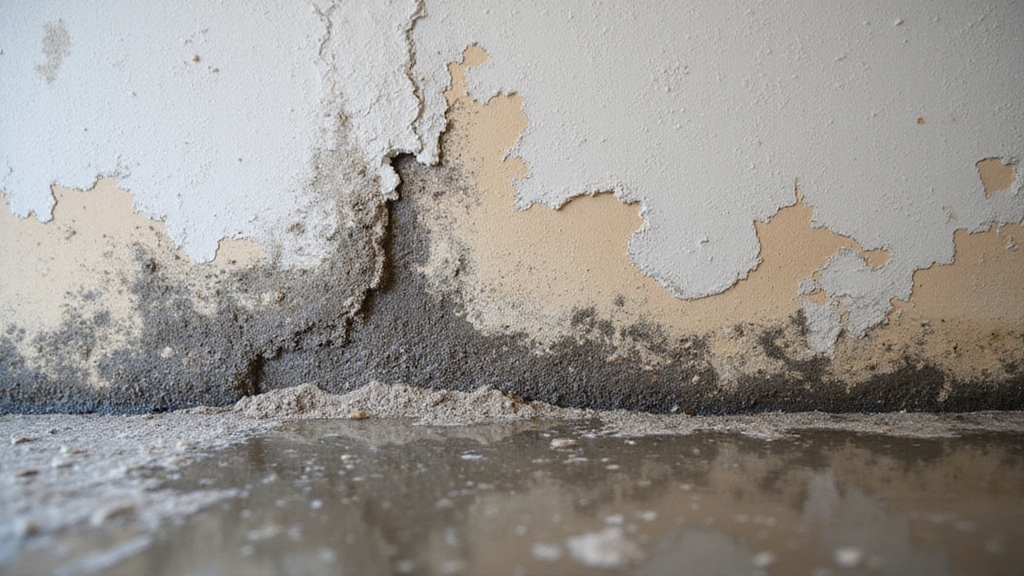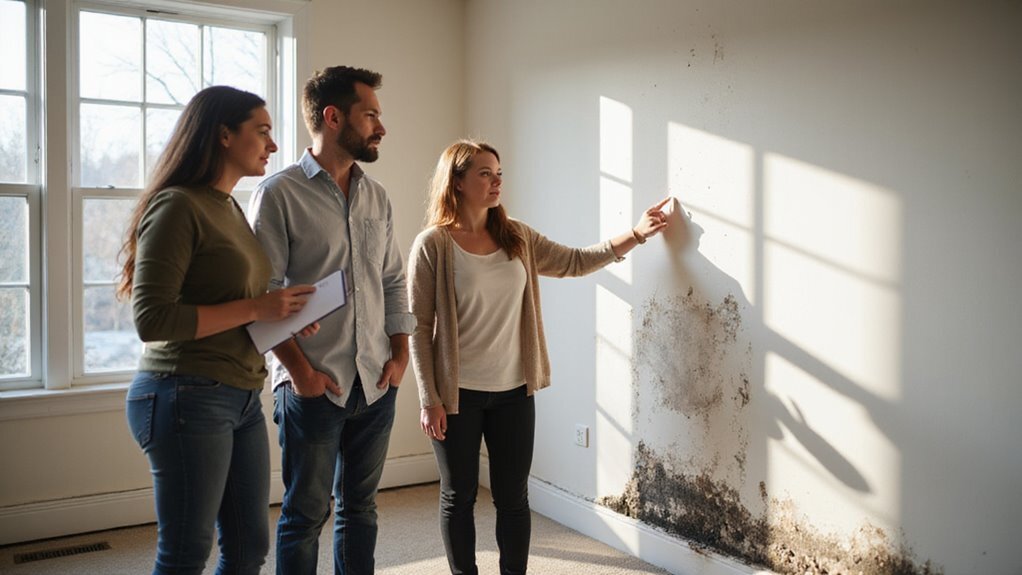Mold and water damage are common problems in homes, affecting about half of all U.S. properties. If you plan to sell your house, these issues can threaten the sale and your reputation. Buyers expect honesty about a home’s condition.
Hiding mold or water problems can lead to lawsuits or canceled deals. Even small areas of damage can make buyers worry about health risks and extra costs.
These problems can turn a simple sale into a stressful experience. To disclose mold and water damage to buyers, you must inform them clearly, document everything, and follow state rules.
Good disclosure builds trust and protects you from legal trouble. It also helps the sale go smoothly. This blog will guide you step by step to handle mold and water damage disclosures confidently and correctly.
Understanding the Risks of Mold and Water Damage

Mold and water damage are serious risks for both health and property. Mold can cause breathing problems and allergies. Water damage can weaken your home and lead to expensive repairs.
If you notice musty smells or stains, there may be mold or water damage. Early action is important to prevent bigger problems. Fix leaks quickly and use dehumidifiers to lower moisture. Proper ventilation helps stop mold from growing. If water damage happens, start repairs right away. Delaying action can make damage worse and lead to mold growth.
Understanding the fair market value of your home is essential when addressing damage and planning repairs, as it impacts your property’s overall worth and sale potential. Conducting a title search can reveal underlying issues that might affect your home’s value and sale process.
If you ignore these problems, your property’s value may drop. Hidden damage can also lead to legal trouble if you sell your home. Always check for and address mold and water damage quickly.
Legal Requirements for Property Disclosure
Most states require you to tell buyers about any known mold or water damage when selling a home. The law often asks for this information on a property disclosure form. You should list any past water leaks, mold, or related problems.
If you filed insurance claims for water or mold damage, you must report them. These claims can affect how buyers view your property’s risk. They may also influence future insurance options for the home. Understanding how home value can be impacted by such issues is important for sellers and buyers alike.
Not sharing known issues can cause legal trouble. You could face lawsuits or lose the sale. Accurate disclosure protects you and helps buyers understand the home’s condition.
Mold or water damage may change the property’s value. Being honest is key. You should check your state’s rules or talk to a real estate lawyer to follow the law. Additionally, a title search can ensure there are no legal claims or liens related to the damage.
Identifying Signs of Mold and Water Damage

You can spot mold and water damage by looking for clear signs in your home. These signs help you meet legal rules when selling. Early detection also protects you from future problems. Being aware of disclosure requirements can help you handle the sale properly and avoid legal complications.
Homeowners should check places that often get wet, like basements and bathrooms. Mold often appears as dark spots or a strong, musty smell. Stains on walls or ceilings can show water has leaked in. Additionally, reviewing public records can reveal recent property transactions involving water damage repairs, which may influence your disclosure obligations.
Bubbling paint or warped floors mean moisture is trapped underneath. Deteriorated caulking around tubs and sinks can also point to leaks. If you notice these issues, you may need repairs before selling.
Getting a Professional Inspection
A professional inspection is important because visual checks may miss hidden problems. Certified inspectors use special tools to find moisture and mold. If you skip this, you may not spot serious issues. Selling your home to cash buyers in divorce cases can be streamlined by understanding property conditions, making inspections even more valuable. Analyzing sales data of similar properties helps determine the true extent of damages and market value. If you suspect water damage, some states require a professional inspection.
Skipping this step could lead to legal troubles. A proper inspection helps you know what repairs are needed. Buyers see a professional inspection as a sign of honesty. This shows you care about fixing problems before selling. Always choose a licensed inspector who knows local laws. If you follow these steps, you protect your home’s value. You also avoid surprises during price talks with buyers. This makes the selling process smoother for everyone.
Documenting the Extent of the Damage

Documenting the extent of mold and water damage protects you legally and keeps the property sale process clear. Take clear photos and videos of every damaged area. Add the date and location to each image or video. You are trained on data up to October 2023. Create a map of the damage, noting the exact room and area. Include the size and seriousness of each spot.
If possible, use a floor plan for easier reference. Keep all inspection reports and repair estimates together. Record the inspector’s findings, dates, costs, and contractor details. Save any communication about repairs or damage. If you follow these steps, you can prevent future arguments about the property’s condition. Proper documentation also helps buyers trust you.
Preparing Disclosure Statements
Disclosure statements explain any mold and water damage in your property. These statements must follow state and local laws. Sellers should collect inspection reports, water testing results, and repair records. Each document should show the type, location, and extent of the damage.
If repairs or prevention steps were taken, list them with the dates. Buyers need clear, honest information. If you had professionals test or fix the issue, include those details. Always use the language required by your area’s disclosure forms.
Providing proof of repairs and prevention can help protect you from legal problems. If you give full and accurate details, buyers understand the home’s true condition. Proper disclosure can also impact the property’s tax implications, especially if repairs increase basis or influence sale timing.
Communicating With Potential Buyers
When you meet with potential buyers, always give clear verbal disclosures about any mold or water damage. Provide thorough written documentation to support your statements and protect yourself legally. Be prepared to answer all buyer questions accurately and transparently to maintain trust and compliance.
Additionally, understanding property condition can help you better explain how repairs or renovations might impact the property’s value and marketability. Being honest about cash buyers’ advantages can also encourage quicker decisions and streamline the sale process.
Clear Verbal Disclosures
You can help buyers understand a property’s condition by giving clear, simple verbal disclosures. Always speak directly about any issues you know. Clear communication helps prevent confusion and legal problems.
Start by sharing facts about water leaks or mold. Mention if professionals fixed these problems. Give buyers details about when and how repairs were done.
If buyers ask questions, answer honestly. Never hide information or exaggerate. If you do not know something, say so clearly.
Buyers may worry about health or property value if there were mold or water issues. Acknowledge these concerns openly. If you have documents, offer to show them.
Written Documentation Provided
Written documentation gives clear, legal proof of a property’s condition. It helps protect you and informs buyers about the home. Always provide these records in addition to any verbal disclosures.
You should gather all important documents, like inspection reports and repair receipts. Include records for water damage repairs, mold removal, and routine maintenance. Make sure to add details about any mold prevention steps taken.
If you have papers about waterproofing or better ventilation, include them too. List dates, contractor names, and any warranties. These documents help buyers understand the property’s history.
Organize all information so buyers can read it easily. If you do this, you also meet your state and local disclosure rules. Written records reduce the risk of future legal problems.
Answering Buyer Questions
Buyers usually ask about past water damage or mold problems. You should answer with honesty to comply with the law and gain trust. If you share clear facts, buyers will feel more confident.
You should explain exactly when and where damage or mold appeared. State how the issue was found by you or a professional. If you have documents, offer them as proof.
Describe what you did to fix the problem. Tell buyers about any repairs or professional mold cleanup. If you have receipts or reports, show these to buyers.
If buyers ask about future risks, explain your prevention steps. You can list regular maintenance and any upgrades made. Buyers will appreciate knowing how you protect the home.
Timing Your Disclosure
You must disclose mold and water damage as early as possible, ideally before negotiations begin. Early notification builds trust and helps you comply with legal obligations. If you wait until negotiations, you risk legal complications and losing buyer confidence.
Early Notification Importance
Early notification is important when selling a property with mold or water damage. It helps you follow the law and builds trust with buyers. If you tell buyers early, you avoid surprises and problems later.
Buyers can check the real condition of the property if you share issues right away. They can plan for extra repairs or costs before buying. Early notice also shows you are honest and careful.
If you wait to tell about mold or water damage, you may face legal trouble. Lawsuits for hiding problems can be expensive. Always communicate clearly and quickly about any damage.
Disclosure During Negotiations
You must tell buyers about mold or water damage at the start of negotiations. Early disclosure helps avoid problems later. It keeps the process clear for everyone.
If mold or water damage affects health or the home’s structure, you should explain this. Include any insurance claims or repair records. Clear information helps buyers make good choices.
If you do not share these issues early, you could face legal trouble. Always check your local laws about what and when to disclose. If unsure, ask a real estate professional for advice.
Addressing Buyer Concerns
Mold and water damage can worry buyers because of health and cost risks. Buyers often ask about the damage and repairs. Sellers should answer these questions clearly and honestly.
You should give records of any water damage and mold cleanup. If you have them, share reports from professionals who fixed these problems. Always mention any warranties that cover the repair work. Provide records of water damage and mold cleanup, plus any professional reports or warranties related to the repairs.
Explain how the damage was found and what steps were taken to fix it. If you have done extra repairs or checks, tell the buyer. You should also give advice on keeping the home safe from future damage, especially considering the importance of no financing fall-throughs in ensuring a smooth transaction.
Providing documentation and transparency can also speed up the sale process by reducing buyer doubts. Being open and honest helps buyers trust you. If you are clear, buyers can make better choices. This also helps protect you from legal issues.
Offering Solutions or Repairs
You should provide clear repair estimates from licensed professionals to help buyers assess the scope of any mold or water damage. If you’ve already completed remediation, present full documentation of the work and any warranties. This approach not only builds trust but also protects you from future legal disputes.
Providing Repair Estimates
When addressing mold or water damage, providing a clear and credible repair estimate is essential for legal compliance and transparency with potential buyers. You must show good faith by collecting detailed information on remediation costs and potential insurance claims. Buyers will expect you to demonstrate the seriousness of the issue and offer realistic solutions. To ensure your repair estimate meets legal and ethical standards, follow these steps:
- Obtain Written Quotes: Secure estimates from licensed, reputable contractors specializing in mold and water damage remediation.
- Detail Remediation Costs: Clearly separate labor, materials, and any specialty services needed for safe repairs.
- Reference Insurance Claims: Document any insurance coverage or claims filed, noting what’s covered or excluded.
- Disclose Estimate Sources: Provide contact details for contractors or adjusters for buyer verification.
These steps protect you and reassure buyers.
Presenting Completed Remediation
You are trained on data up to October 2023. When presenting completed remediation to buyers, you must provide detailed documentation showing all actions taken to address mold and water damage. Include receipts, warranties, and reports from certified professionals who performed remediation techniques.
Clearly outline how you minimized environmental impact during cleanup, such as proper disposal of contaminated materials and use of eco-friendly products. Legally, you’re required to disclose not just the previous damage, but also the specific steps taken to restore the property’s safety and habitability.
Make these records available for buyer review and encourage third-party verification. This transparency demonstrates good faith, supports legal compliance, and reassures buyers that the property no longer poses health or environmental risks due to mold or water intrusion.
Working With Real Estate Agents
Selling a home with mold or water damage can be difficult. A real estate agent helps you follow all rules and laws. The agent makes sure you share correct information with buyers.
The agent will help you complete all needed paperwork. They can show buyers what repairs or prevention steps you have taken. Your agent may also suggest extra inspections to give buyers peace of mind.
If you are unsure about local laws, your agent can explain your duties. This reduces your risk of future problems. Trust your agent to guide you through a safe and honest sale.
Handling Offers and Negotiations
Selling a property with mold or water damage affects both price and contract terms. Sellers should be honest and clear when handling offers. Full disclosure of all known issues is necessary.
Sellers must provide written details of any mold, water damage, or safety risks. Inspection reports and repair estimates should back up these disclosures. Buyers may lower their offers or ask for repair credits.
If buyers ask for repairs or concessions, sellers should reply quickly. All agreements must be documented in writing. A real estate agent can help ensure all actions meet local laws.
Open communication about environmental hazards builds trust. Transparent negotiations help protect both sides. Honest handling of the process increases the chance of a fair agreement.
Protecting Yourself From Liability
When selling a property with mold or water damage, clear disclosure is the best way to avoid legal problems. Sellers must follow all laws and best practices during the sale. If you inform buyers about any issues, you protect yourself from future blame.
You should list all mold and water damage in writing on the correct forms. Sellers must show proof of any repairs or cleanup related to mold or water. If you hire professionals to inspect your home, share their reports with buyers.
Keep detailed records of all communication and documents during the sale. These steps help show you acted honestly. If you stay transparent, you lower your risk of disputes after the sale.
Learning From Real-Life Case Studies
You need to understand how real cases highlight the risks of hiding mold or water damage, including lawsuits and costly settlements. When sellers choose full transparency, they often avoid legal trouble and build trust with buyers. You’ll see that honesty can lead to smoother transactions and fewer disputes.
Legal Consequences of Nondisclosure
If you do not disclose mold or water damage, you may face legal trouble. Courts often hold sellers responsible for hiding these problems. Failure to disclose can lead to serious consequences.
Buyers can sue sellers for fraud or misrepresentation. Legal cases can become expensive and stressful. If the court sides with the buyer, you may lose the sale.
A judge may order you to take back the property. You could also pay for repairs and other damages. Some courts even award extra money as punishment.
Your reputation as a seller could suffer. Future buyers may hesitate to trust you. If you want to avoid these problems, always be honest about property issues.
Successful Seller Transparency
Successful seller transparency means telling buyers about mold and water damage right away. Sellers who do this often get better results. Clear disclosure helps avoid problems later.
You should provide records of past issues and repairs. Receipts from professionals show you fixed problems the right way. If you use waterproofing methods, include those details too.
Case studies show that honest sellers build trust with buyers. Trust lowers the chance of legal trouble after the sale. If you want a smooth sale, be open from the start.
Ongoing maintenance also matters. You can mention steps like adding sump pumps or vapor barriers. When buyers see this, they feel more confident about the home’s condition.
Buyer Reactions to Honesty
When sellers are honest about mold and water damage, buyers usually trust them more. Clear disclosure builds confidence and helps buyers understand the property’s true condition. This honesty also influences how buyers value the home.
Buyers may change their offers if they know about repair needs. They often accept lower prices instead of leaving the deal. If sellers provide full details, buyers usually stay interested.
Disclosure can speed up the buying process. Buyers do not need to search for hidden issues when information is clear. This allows due diligence to move faster.
Being open about problems reduces the chance of legal trouble later. Buyers are less likely to sue if they had all the facts. Sellers face fewer surprises after closing.
Conclusion
If you disclose mold and water damage, you protect yourself from future legal problems. Buyers appreciate honesty and will find out about issues eventually. If you are upfront, you build trust and make the process smoother.
If you decide to sell, you might consider working with a company that buys houses for cash. We buy houses in any condition, including those with mold and water damage. This can save you time and effort on repairs and negotiations.
If you want to sell quickly and avoid hassle, we can help. Contact Limitless Homes of KC today for a no-obligation cash offer. Let us make selling your home easy and stress-free.

